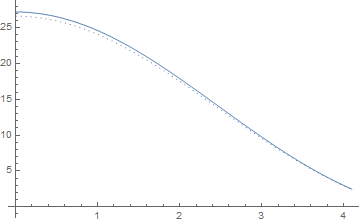bList = Table[b, {b, 0, 4.1, 0.1}];
\[Chi][bList_] = (Z/K1)*NIntegrate[Subscript[f, pp1][q]*Subscript[F, pp1][q]*BesselJ[0, q*bList]*q, {q, 0, 1}] +
(N/K1)*NIntegrate[Subscript[f, pn1][q]*Subscript[F, pn1][q]*BesselJ[0, q*bList]*q, {q, 0, 1}];
I want to do Thread and Interpolation to those values but always give me this error NIntegrate::inumr: The integrand (0.0131326 r Sin[q r])/(1+(E^(1.75439 Plus[<<2>>])+E^(1.75439 Plus[<<2>>])) (0.5 +0.0882389 Power[<<2>>])^1.5) has evaluated to non-numerical values for all sampling points in the region with boundaries {{[Infinity],0.}}.
Subscript[f, pp1][q_] =(6.254736279890945*(1 - 1.4511668475476842*i)*i)/E^(0.2115*q^2)
Subscript[F, pp1][q_] := ((4*Pi)/q)*NIntegrate[Subscript[\[Rho], p][r]*Sin[q*r]*r, {r, 0, Infinity}];
Subscript[\[Rho], p][r_]=0.013132593248303927/(1 + (E^(1.7543859649122808*(-2.380427976610103 - r)) + E^(1.7543859649122808*(-2.380427976610103 + r)))*(0.5 + 0.08823886490842314*r^2)^1.5)
Z = 6;N=6;K1 =1.55;
Subscript[f, pn1][q_] =(18.25974896615874*(1 - 0.8748275119106319*i)*i)/E^(0.2115*q^2)
Subscript[F, pn1][q_]:= ((4*Pi)/q)*NIntegrate[Subscript[\[Rho], n][r]*Sin[q*r]*r, {r, 0, Infinity}];
Subscript[\[Rho], n][r_]=0.012100952740630248/(1 + (E^(1.8975332068311195*(-2.47 + r)) + E^(-1.8975332068311195*(2.47 + r)))*(0.5 + 0.08195512137553475*r^2))


i? Do you meanSqrt[-1]? Then you should useI. $\endgroup$